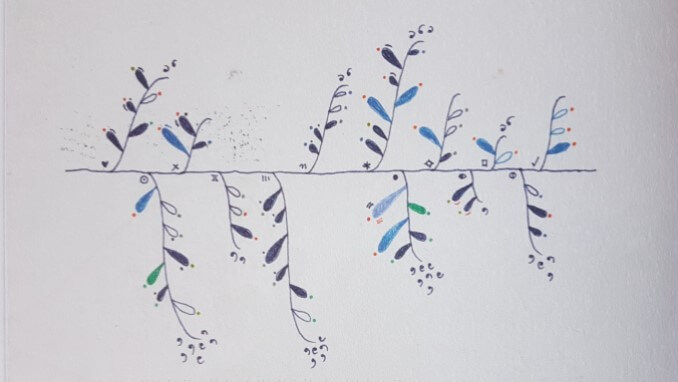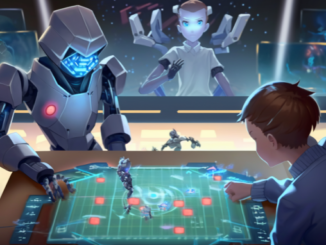
When I decided to run the ‘Quantified Self’ theme in Ludogogy, I knew at once that I would want to write a review of this amazing book. I added it to my collection about a year ago, and it’s hardly been out of my current reading pile since.
Dear Data is available on Amazon
For many people data is a dry topic, and even those who are actually into the idea of the ‘Quantified Self’, often leave much of the measurement, and indeed the decisions about what should and can be measured, up to a third party. Wearable tech has no doubt opened up all sorts of possibilities for people to quantify aspects of their own lifestyles, performance and progress towards goals, but the approach in this book is decidedly both more DIY and more eclectic.

As someone who loves messing with spreadsheets, and twisting them to do things they probably (definitely) weren’t designed for, I’m always attracted by more or less anything to do with data – and indeed spreadsheets, but that’s a topic for another post entirely.
I own lots of other books about data visualisation, all of which I would heartily recommend. I am particularly drawn to the work of David McCandless, and my copies of ‘Information is Beautiful’ and ‘Knowledge is Beautiful’ are well-worn with constant use. However, this book holds special significance. It not only shows how ‘quantified self’ data can be made extraordinarily beautiful in its visualisation, but it goes one step further. Far from data being dry ‘number crunching’, it shows how the love of data, and the systematic collection and thoughtful presentation of even the seemingly insignificant details of everyday life can be the basis for the building and maintaining of a relationship.
Information is Beautiful is available on Amazon
Every week Giorgia Lupi (from Italy but based in New York) and Stefanie Posavec (from Denver, but based in London), chose a theme relating to their daily lives. During the week, they would collect data on that theme, following the process of ‘Observe, Count, Explain/Draw, Post’. The ‘Post’ part of the process was decidedly old school – each week they sent a postcard to each other containing a visualisation of the data collected and analysed that week. The book contains reproductions of all of the postcards, along with some explanatory commentary – and it is gorgeous.
Each page consists of both sides of the postcard that was sent from one of them (so 104 postcards in total). The drawn visualation is on one side, the key and instructions for reading on the other.
So, what kind of data were they collecting? Quite often it was about the minutiae of life; food preference, the number and types of doors passed through, the results of smiling at strangers. In the grand scheme of things, these things could be seen as ‘inconsequential’, but that is most of the point of the data gathered in this book.
Knowledge is Beautiful is available on Amazon
They put it very well in the introduction to the book – where they also explain why the book is not a ‘Quantified Self’ (QS) project. Quite often the purpose of QS projects is to ‘improve’ us in some way – make us more active, or thinner, or more efficient. Usually they involve algorithms and tech and computation, designed for us. What Stefanie and Giorgia are trying to achieve on the other hand is to indicate how data can help us to ‘connect with ourselves and others at a deeper level’.
‘Everything can be mapped, counted and measured’
they say, and if anything can persuade you that you might want to do that, it would be this book. The postcards are beautiful works of art in their own right – but playfully treated, and not with any sense of taking things too seriously. After all, there are few things more ephemeral than a postcard.
Facts are Sacred is available on Amazon
It certainly inspired me, and I took up the challenge of measuring various aspects of my life armed with fineliners and Sharpies and a couple of apps – Blip Blip to remind me to note data at specific times, and Epicollect5 to create my own data entry tools. I think to maintain it for a year, I would probably need a partner to keep me colecting – which is probably why this project worked so well.

The drawings in the book are lovely, but knitting/crochet is my preferred artform, so at the back of my mind for some time have been two projects. One is some kind of knitted data project – a scarf of daily winter temperatures maybe!! The other is, of course, some kind of game – although the form that might take is much less clear.
Raw Data is available on Amazon
I daren’t even try starting to collect data on ‘ideas I have had, that have never come to anything, because of lack of time’.
I digress. I cannot recommend this book highly enough. Even if you have no interest in data, it is worth owning simply for its beauty, and the inspiration you will get from seeing the imaginative ways in which the authors were able to so differently visualise similar datasets.
- James Bore – The Ransomeware Game - 13th February 2024
- Ipsodeckso – Risky Business - 23rd January 2024
- Review – Luma World Games - 15th December 2023





Be the first to comment